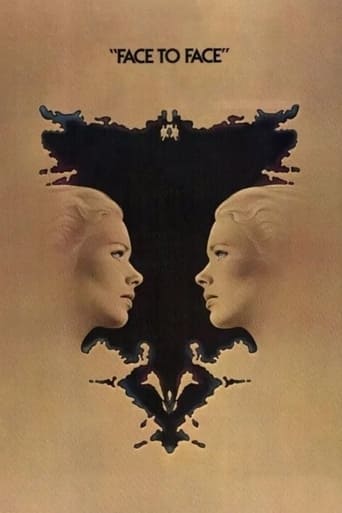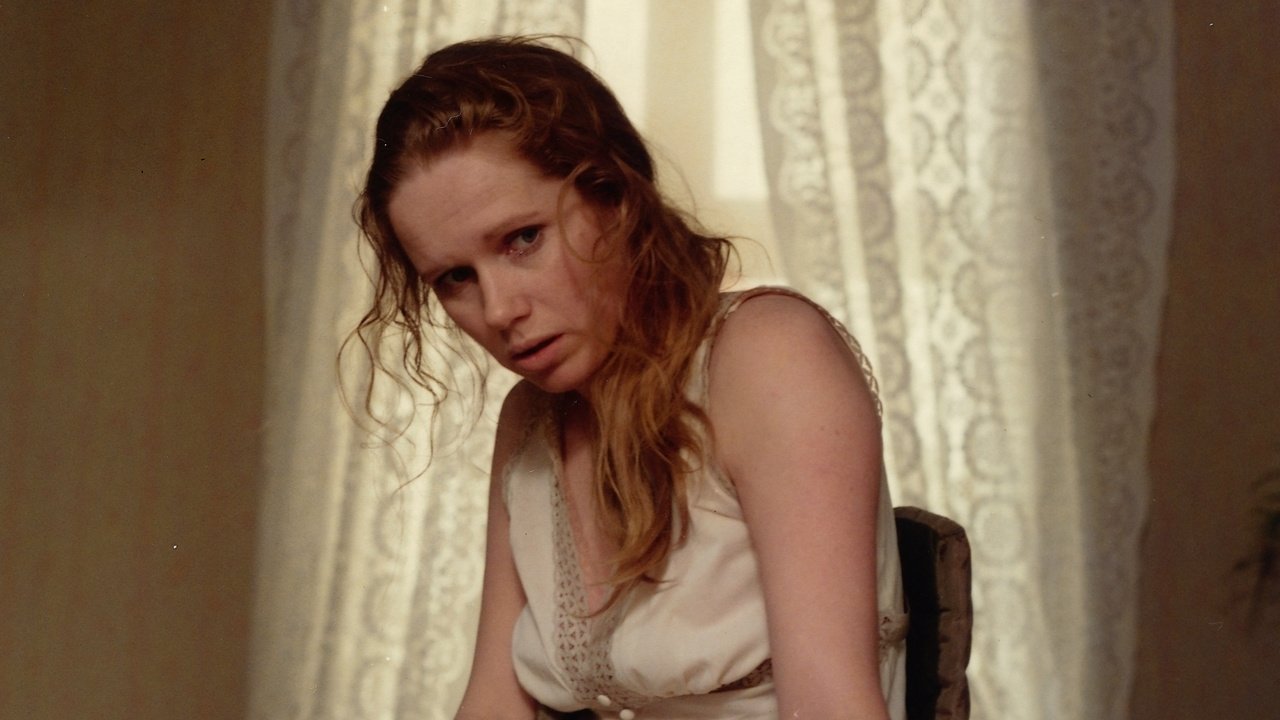TheLittleSongbird
I love and greatly admire Ingmar Bergman, Sweden's greatest director by default, and his films. Face to Face is not one of his very best, but of a generally highly impressive resume it is up there as one of the better ones. Sven Nykvist's cinematography is both gorgeous and atmospheric, and the nightmarish dream sequences are really striking. The dialogue as you would except from a Bergman film really makes you think, Bergman's direction is superb and the story is dark, harrowing and hugely personal. Erland Josephson provides an ideal counter-point to Liv Ullman. Bergman regular Gunnar Bjornstrand's role is very short but he does leave an impression. The best asset of Face to Face is easily the extraordinary performance of Liv Ullman, I have yet to see a bad performance from her and this for me was one of her best ever, enormously intense, very commanding and her eyes are as expressive as they ever were. She is especially good in the telling of the attempted rape, which had so many complex emotions, all of them nailed. In conclusion, Face to Face is one of Bergman's better films, if not one of the finest among the likes of The Seventh Seal and Fanny and Alexander, lifted by Ullman's performance. 10/10 Bethany Cox
MisterWhiplash
Hey, it's Bergman PLUS Liv Ullmann, the greatest actress on the planet, and she's playing a psychiatric doctor who is slowly but very surely going wholly bonkers. Scenes carry depth and anxiety and a sense that things can come apart even when things seem serene - and when it gains momentum near the end, it's a wonder to behold. What's not to love? Actually, I will be critical of one scene - in the 2nd half of the film, Bergman puts Jenny, his protagonist, into a double-state (hey, why not when it's a psychological thing) as she is about to, and does, a suicide attempt and recovers in the hospital and then goes into dream states. Most of these dream scenes are effective in depicting a mind at battle with itself and the personal demons of old coming back in full force (two such scenes are when Jenny confronts her parents, a back and forth *true* Love/Hate scene that is staggering, and another where she is surrounded by her patients in a room, one of them her grandfather who says flat out he's afraid of dying, to which she responds 'Just count to ten, and if you're still alive... count to ten again', which is great).However, there is a scene that is very heavy-handed to me - yes, even for Bergman - where he has his leading lady see herself in a casket, the casket is closed shut as she is yelling and banging on the door, and then the casket is set on fire as Outside Jenny laughs. To me, this just made me go "Really, Ingmar, you're gonna go there?" But that's nitpicking when in the midst of a master at work, and boyo-boy it is a master at a career peak - given a boost by Ullmann, who starts out pretty sweet and 'normal', and then her character goes through a traumatic event (an attempted rape), but we learn that this is not even what makes her go insane - far from it, that's just the icing on the Crazy Cake. As Bergman delves deep into this woman's psychosis, it reveals how harrowing it can get, but also, ultimately, how important it is to live and to try to find some semblance of peace. Love, ultimately, is the goal, to find some caring and harmony in life while we're here.If nothing else, the scene where Ullmann finally unloads her personal and mental baggage on a bewildered but patient and understanding Erland Josephsson should've gotten her TEN Oscars by itself. I rarely say this, but God bless Liv Ullmann, and Dog bless Ingmar Bergman. ;)
bennyraldak
There are lots of truly great filmmakers in cinema history. Great films have been made everywhere in the world in the last 115 years. But true masters who fundamentally influenced and changed cinema are but a few, relatively speaking. Of course it first started with the 'fathers'. The people who participated in the birth of cinema, and help build cinema from the foundation up in early 1900, like D.W. Griffith in the United States, Giovanni Pastrone in Italy. And then in the 1920s filmmakers like Sergei Eisenstein in Russia, F.W. Murnau and Fritz Lang in Germany, Alfred Hitchcock in England, Cecil B. DeMille and King Vidor in the United States. Then in the 30s cinema had surpassed it's 'birth' stage, and was starting to evolve; grow. The format, the language and technique of a film were set and familiar. We knew what 'a movie' was, so now let's make them better and better. The final essential evolution was sound. From this point on the form was ripe. That's when the true masters of cinema slowly started to appear.Hitchcock is one of the most unique ones of the true masters, since he also was one of the fathers of cinema. He started in the mid 20s all the way up to 1976..! There are few to none other masters that can claim to have a number of classics in every decade from the 20s up to the 70s. But there are more, and even more interesting masters in cinema. People like Orson Welles, Akira Kurosawa, Federico Fellini, Stanley Kubrick, Ingmar Bergman and Jean-Luc Godard seem to be regarded as the greatest masters in general. Next to Kubrick, my favorite in this group is Ingmar Bergman.The cinema of Ingmar Bergman consists of films about people... struggling. Bergman is famous - and infamous - for his so called 'depressive movies'. But, for me it's so obvious and essential that they're not depressive at all. They depict the darkest and bleakest themes and subjects, but Bergman films are often very hopeful in the end. Lots of characters in his films are depressed; or struggling with anxiety and fear, sure. But depression is never his main goal. Bergman depicts, disassembles, analyzes and explores the human psyche. The soul. Meaning. And always in/near the context of the greatest existential concepts and ideas. The meaning of life might be rooted in emptiness in his work, but it's what we as humans do with life and ourselves that creates the existence of beauty, love and spiritual connection (which is my personal vision as well). Bergman is masterful in creating the most beautiful moods ever made in cinema. His films sometimes feel like the wind; sometimes like a mirror burning with fire; sometimes like an angry clown. But he touches you, from deep within."Ansikte mot ansikte" (aka "Face to face") is a film about Jenny (played by Liv Ullman). Jenny is a psychiatrist who is confronted with one of her deeply disturbed but tragically endearing patients called Maria. A woman lost in an erotic spell of insanity and troubled thoughts. A mystery. As the film progresses Jenny slowly but surely seems to go in the same direction as the enigmatic Maria. We learn about her inner-demons and outher-troubles as she falls into the abyss of the human psyche. When she 'breaks' in the centre of the film, the film goes inwards - we experience her world of troubling thoughts and experiences in a beautifully confusing dreamlike innervision (think "Lost Highway" without the modern/pop element). In the end it all turns out to be...This was the one Bergman film I had yet to see for a long time. Brilliant and beautiful!
yuval bursztien
This is a very good film. You better watch it after you have seen some of th other Bergman movie, because its one of his more complicated movies.A psychiatrist suffers from something she cant understand. We will join her in her search for redemption. On the way will see complicated relationships, dreams with a deep meaning, and metaphoric visions. Very powerful moments in this movie. Those who love Bergman are sure to enjoy this, this is one of the best of his 70s/80s movies.Except the interesting storyline there's also good acting form all the players and an amazing acting from Liv Ullmann. Her fans will surely enjoy this.


 AD
AD




